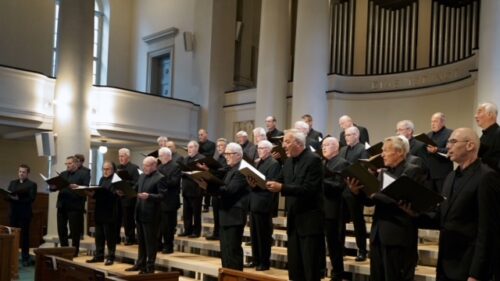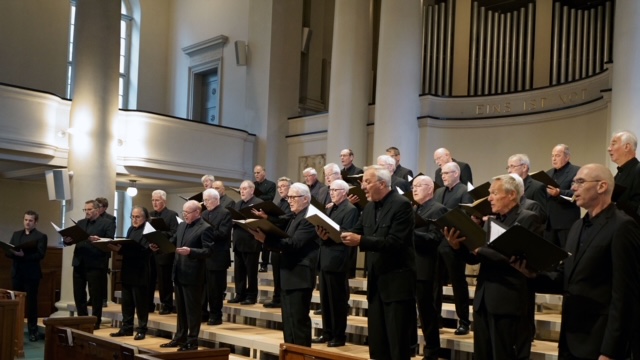 Switzerland Duruflé, Tournemire, Poulenc, Fauré, Gounod: Männerchor Zürich (Roger Widmer [director, tenor], Merit Eichhorn [organ]). Grosse Kirche Fluntern, Zürich, 3.10.2021. (GA)
Switzerland Duruflé, Tournemire, Poulenc, Fauré, Gounod: Männerchor Zürich (Roger Widmer [director, tenor], Merit Eichhorn [organ]). Grosse Kirche Fluntern, Zürich, 3.10.2021. (GA)

Maurice Duruflé – ‘Notre Père’, Op.14; Messe ‘Cum Jubilo’, Op.11
Charles Tournemire – Cinq improvisations pour orgue
Poulenc – Quatre petites prières de Saint François d’Assise
Fauré – Cantique de Jean Racine, Op.11
Gounod – Deuxième messe pour les sociétés chorales
As the brilliant autumnal afternoon fades, what could be more delightful than a musical hour in Zurich’s Fluntern church? The Männerchor Zürich is offering a programme of French sacred music with names familiar – Poulenc, Fauré, Gounod – and less so, to this reviewer at least: Duruflé, Tournemire. Also, the church has a very respectable organ.
Remarkable: there are two(!) complete masses on the programme, in addition to assorted other pieces, presented in inverse order of chronology and, I assume, familiarity: Duruflé leads the procession. His Mass ‘Cum Jubilo’ is preceded by the brief ‘Notre Père’: The Lord’s Prayer – or the first half of it. For by dispensing with the ‘kingdom’, the ‘power’ and the ‘glory’ of the conclusion, Duruflé presents a humble petition, simple and affecting: to give us bread, forgive our transgressions, preserve us from evil. The piece functions wonderfully well as an introit.
The Mass ‘Cum Jubilo’ makes clear that Duruflé derives his main inspiration from Gregorian chant: yet tonally, one should not expect to hear Dorian, Phrygian, or Hypomixolydian modes here. No, the harmonies – in the organ merely, for there is but a single vocal line throughout – are definitely twentieth century. The Männerchor director, Roger Widmer, did double duty as soloist for the Gloria and the Benedictus. As the sole polyphonic instrument, the organ clearly had its work cut out for it. It accompanied unobtrusively, providing a shimmering ground against which the vocal line was embroidered and contributing powerfully where a forte was called for.
The Cinq improvisations pour orgue ‘by’ Charles Tournemire, were actually set down by Duruflé. Tournemire was an improviser of note on the organ, and Duruflé, in reconstructing and giving concrete form to these extemporisations, set a monument, an homage to his revered teacher. Merit Eichhorn presided in the organ loft, treating the audience to a sound more ample and venturesome than customary in most church services.
Poulenc wrote his Quatre petites prières de Saint François d’Assise at the request of a cloistered relative: thus, written for and first performed by Franciscan friars, is it any wonder that Gregorian chant has left its imprint here, too? However, Poulenc clothed these texts in his own unique harmonic guise. The result is a gem whose brief fire (only eight minutes!), faithfully reflects the spirit of St Francis in modern musical form. Here, the Männerchor had occasion to demonstrate its a capella chops, and their rich, compact tone did not disappoint.
Finally we escape the Gregorian influence: for while Fauré’s Cantique de Jean Racine is based on an even more ancient text from the fourth century, it had been reworked by the seventeenth-century dramatist; and musically, the piece is entirely modern, ‘very Fauré’, one might say, as it prefigures his Requiem. Celestially serene, measured, with a stately organ accompaniment, the piece offered a perfect segue from the preceding a capella to the storm that would follow.
For one thing had definitely been missing from the programme: a demonstration of choir and organ at full cry and in full-rich harmony; a work constrained neither by medieval monody nor the arguably brittle twentieth-century harmonic costume.
Enter Gounod. Deuxième messe pour les sociétés chorales is a work intended for those large choirs that formed from the early nineteenth century, and whose tradition continues in our day – as this concert amply demonstrates. The confidence, fervour and patriotism of that earlier age has been rudely tempered by many intervening decades of war and calamity. But they did make a glorious noise! And that is what the Männerchor Zürich with Roger Widmer and Merit Eichhorn gave its grateful audience as the brilliant afternoon faded to dusk.
Griff Anderson
